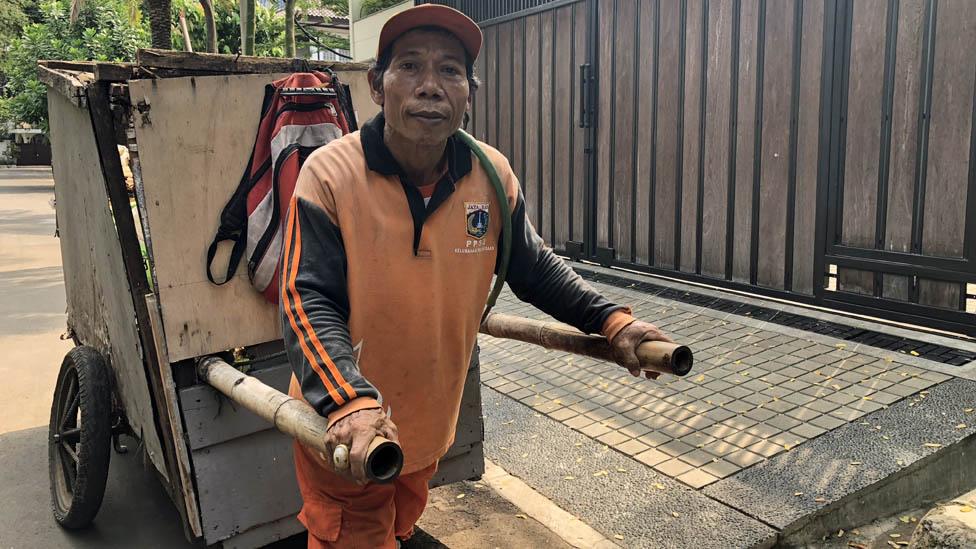How a country suddenly went ‘crazy rich’
- Published

Indonesia, the nation with the world's largest Muslim population, is home to a rapidly growing middle class. As Rebecca Henschke reports from Jakarta, this has given rise to a striking phenomenon - the so-called "Crazy Rich" Indonesians.
The colourful invitation on our cluttered fridge had said it would be a dog-themed birthday party. "That's cute," I thought - and different. Traditionally in this country dogs are not well-liked or looked after.
But that wasn't the only surprise. To celebrate their little girl turning six, her family had turned an empty piece of land in Menteng, the most expensive part of Jakarta, into a park for the day.
Security guards escorted us off the street into another world. Real grass - an incredibly rare thing in this concrete jungle - had been rolled out. There were also fully grown trees and an obstacle course for dogs.
In one corner, a groomer was giving appreciative canines - which had also been specially brought in for the event - massages and baths. In another was an air-conditioned marquee where the parents were sipping freshly made iced coffees - and, later in the day, wine. High alcohol taxes here mean wine is expensive.

From Our Own Correspondent has insight and analysis from BBC journalists, correspondents and writers from around the world
Listen on iPlayer, get the podcast or listen on the BBC World Service, or on Radio 4 on Saturdays at 11:30 BST

The middle of the "park" was filled with dog-shaped balloons, a bubble-blowing performer and a slime-making station.
That was back in October and I had just got back from reporting the destruction, grief and devastation in Palu, on the island of Sulawesi, which had been hit by a tsunami and earthquake. It made for a bizarre, almost surreal contrast.
"Where do you go from here?" I whispered to one of the other parents. "What would an 18th birthday party have to be, if you kept this up?"
"It's not what the children ask for, it's really for the parents," she replied.
The party bag we left with was three times the size of the present we had brought.
I'm not sure why I'm still surprised. Parties like this have become the norm among the upper-class Indonesian children that my kids now go to school with.
One family hired a film company to re-edit the Hollywood blockbuster Suicide Squad so that the birthday girl appeared as a character in key scenes. The kids watched it on a cinema-sized screen in the ballroom of a top hotel.

On that occasion I had recently returned from a trip to the remote province of Papua, where I was covering a children's health crisis - tiny malnourished toddlers dying in a measles outbreak.
When the film Crazy Rich Asians came out here in September, people took to Twitter to tell stories of the "crazy rich Indonesians" they knew, particularly in country's second biggest city, Surabaya.
The hashtag #crazyrichsurabayans started trending on social media after a local teacher at an elite school shared anecdotes about the family of one of her students - tales of them travelling to get their vaccinations done in Japan and of holidays in Europe. She is now writing a book about it and there is talk of a movie.
Recently, the luxurious lavish wedding of a couple from Surabaya was dubbed the ultimate Crazy Rich Surabayans event by local media. Hundreds of guests from Indonesia and abroad attended, it was reported, and all were said to have been entered into a prize draw for a Jaguar sports car.
The groom, it's understood, had proposed with the assistance of a flash mob in front of hundreds of total strangers at the Venetian Macao resort.
Many members of Indonesia's growing upper-middle class, concentrated solely in the west of the country, have money their parents would never have dreamed of - and most think it's normal, and perhaps even essential, to show it off.
Following a massive reduction in the country's poverty rate in the last two decades, one in every five Indonesians now belongs to the middle class.
They're riding a commodities boom - the burning and churning-up of this vast archipelago's rich natural resources, including logging, palm oil, coal, gold and copper. This, combined with aggressive domestic spending, low taxes and little enforcement of labour laws, means that those who know how to play the system are raking it in.
Salimun is one of the many who don't understand that system - but has, in a way, also eked out a future for his children that is very different from his own life.

He is a street sweeper, paid the minimum wage of £194 ($254) a month to take away the waste of the wealthy houses in Menteng - great plastic mountains in front of Greco-Roman-inspired concrete mansions - piles of rubbish like monuments to out-of-control consumerism.
He drags by hand a cart that he banged together from scavenged wood. He is the strongest man I have ever seen. My children call him Superman. He pulls anything that might have value out of the trash, sorts it and stores it at our house - and then sells it on.
Salimun lives in a room behind our house - he effectively came with the property. He was squatting there at the time we came to look it over before deciding to rent it, and asked if he could stay.
I am glad we decided, after some debate, that he should - he has become like an uncle to my children.
He's a farmer at heart who has turned our swimming pool into a fish pond and the garden into a banana plantation.
When I cleaned out my wardrobe and left a pair of high-heeled leather boots I didn't wear any more out at the front to give away, I found him wearing them. He had cut off the heels and was very pleased with them.
Whatever he earns, he sends home to his family in a village in central Java, going home just once a year to see them. That money from the waste of the rich has meant that his children finished high school and now have jobs in manufacturing, producing goods for the shops in the giant glittery shopping malls of Jakarta.
"What's an iPad?" he once asked me. "My son says he really needs one. How does it work?" I talked him out of paying for one, suggesting a cheaper alternative.
His daughter came to stay briefly - she seemed very interested in her phone.
Salimun might not be crazy rich, but the next generation are already seasoned consumers.
Join the conversation - find us on Facebook, external, Instagram, external, YouTube, external and Twitter, external.
